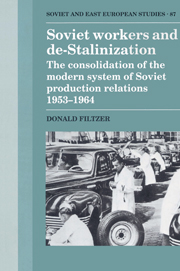 Soviet Workers and De-Stalinization
Soviet Workers and De-Stalinization Published online by Cambridge University Press: 29 January 2010
De-Stalinization, if it was to have its desired impact, had to extend to the workplace. Repression, even in the 1930s, had simply failed to prove itself a viable stimulus to work. In 1956, therefore, the regime set out on a different path to try to create a popular feeling of identification with the system and its leadership. The 1940 criminalization of job-changing and absenteeism was repealed, so that workers could switch jobs without fear of legal reprisals. There was also an extensive reform of the trade unions, designed to give them the appearance, if not the reality, of greater responsibility to their members. As part of this reform, new labour regulations made it far more difficult for managers to fire workers except for serious discipline violations. A coercive element was to be retained, but this was to be enforced in the main not through labour law, but through the incentive system, as implemented in the wage reform of 1956–62, which is discussed at length in chapter 4.
The reform of labour law meant significant changes in the state of the labour market. Workers were once more free to move about at will and had less to fear from the threat of dismissal. These changes, which had been essential from the point of view of the political liberalization of Soviet society, at the same time pushed the balance of power on the shop floor a little more in workers' favour, and in this sense helped to undermine the regime's economic strategy.
To save this book to your Kindle, first ensure [email protected] is added to your Approved Personal Document E-mail List under your Personal Document Settings on the Manage Your Content and Devices page of your Amazon account. Then enter the ‘name’ part of your Kindle email address below. Find out more about saving to your Kindle.
Note you can select to save to either the @free.kindle.com or @kindle.com variations. ‘@free.kindle.com’ emails are free but can only be saved to your device when it is connected to wi-fi. ‘@kindle.com’ emails can be delivered even when you are not connected to wi-fi, but note that service fees apply.
Find out more about the Kindle Personal Document Service.
To save content items to your account, please confirm that you agree to abide by our usage policies. If this is the first time you use this feature, you will be asked to authorise Cambridge Core to connect with your account. Find out more about saving content to Dropbox.
To save content items to your account, please confirm that you agree to abide by our usage policies. If this is the first time you use this feature, you will be asked to authorise Cambridge Core to connect with your account. Find out more about saving content to Google Drive.